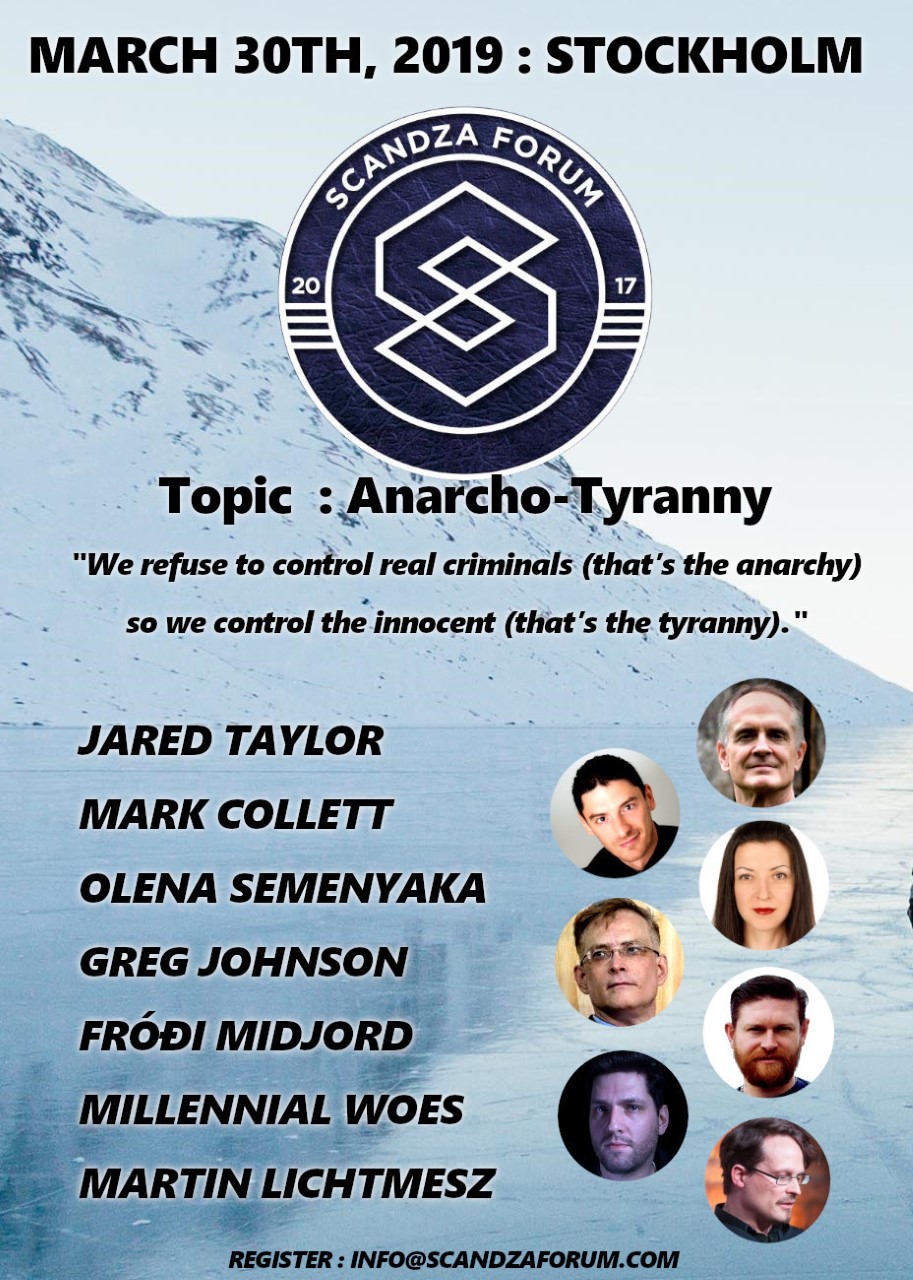The Dirty Secret: Thoughts on Being a Mischling
Although I’ve had no love for Jews for most of my life, I am ashamed of the amount of time it took for me to accept that those who are vocally opposed to Jewish influence have legitimate grievances. I had always found myself at odds with social and political phenomena that can ultimately be traced back to that influence, but I had never really understood where they came from. My objections to pornography, sex trafficking, and the hypersexualization of women and children in advertising and entertainment were wrongly directed against men in general. My awareness of grave injustices and smokescreens such as 9/11 laid blame at the feet of an entirely faceless global enemy.
It also took longer than I might have hoped to recognize that what I love about humanity — my sense of beauty and aesthetics, musical preferences, values, appreciation for Western architecture, respect for animals, dress, culture, history, literature — the poetry of life — must ultimately all be credited to Europe and her peoples. I now understand that the corruption and subversion of those things close to my heart has largely been the result of external influence and values that are not only foreign but largely antithetical to those of the European tradition.
Slowly, I learned that the enemy is not faceless.
I had believed that people largely hated Jews for their ability to preserve tradition for many thousands of years and for their strong group identity. It took someone explaining to me very politely how others see plainly anti-social Jewish behaviors and in-group preference for me to really understand the animosity some hold against Jews.
But the Jewish question for me is more nuanced than it would be for most people. Growing up in a heavily-Jewish community, most of my friends and teachers were secular Jews. However, I was always aware on a fundamental level that I did not really belong in their world, and rejected it fully by the time I was 12.
I knew I was only half Jewish — a “Mischling.” I knew this because it was obvious that my mother was Jewish and my father was not.
My grandparents had been founding members of their synagogue, but my parents were not allowed to get married there because my father was not of the faith. We celebrated both Christmas and Hannukah when I was a child (the food is a lot better at Christmas) but not Easter. From pre-school to first grade, I attended a Jewish private school where I was taught to revere Israel and encouraged to raise money for it UNICEF-style, as well as spending half the day learning about Jewish culture and reading/singing in Hebrew. From second grade through the end of middle school, I attended public schools comprised mainly of Ashkenazi children. To compensate, my mother made me go to “Hebrew School” three times a week. Hebrew School was an after-school program where Ashkenazi children could learn prayers, Hebrew, and the Torah. (The children in my Hebrew School were most likely attending public schools as well. The more serious orthodox and Hasidic Jews attended private and “Talmudic schools” for the entire duration of their schooling.)
As far as I know, I was always accepted as Jewish, even though I was technically only half. My childhood best friend, an adopted girl with blonde hair and blue eyes whom I met at our private school, was also (from what I remember, being six years old) accepted as Jewish, even though she was not Ashkenazi or any other type of Jew. No one really asked questions. She was far from the only blonde kid there either.
I learned more recently that the act of saying something to try to find out whether someone is Jewish (or drop the hint that you are) is called “bageling.” Once a “bageler” finds out you are Jewish, they seem to light up. You suddenly have something in common. It doesn’t seem to matter if you are half, one quarter, one eighth Jewish — what is important is that you have that component of your identity.
The only one who plays the “Jewish or not Jewish?” game more than “anti-Semites” is my own mother.
As for me, I rejected that component of my identity early on. At the age of 11, I refused to go to Hebrew School any longer. They graduated me early along with that year’s class to avoid shaming my family. I was never Bat Mitzvahed (Jewish rite of passage done at age 12 for girls and 13 for boys.) When it came time for high school, I made a conscious decision to leave the area and went to a decidedly-not-Jewish school in another town that had a magnet program. Suddenly, with few exceptions, none of my friends, teachers, and classmates were Jewish, and I was a-OK with that.
In the early 2000s, my siblings visited Israel on free “Birthright” trips which were available to any Jewish person under the age of 25 who could show that they are at least semi-serious about being Jewish. I had exactly no interest whatsoever in going, and found the idea of living in a desert repulsive even in first grade (my teacher was telling us we would all live there one day.)
Although my ancestry would still technically allow me Israeli citizenship, I was recently called a “shiksa” by a full-blooded left-wing Jew. He seemed to go out of his way to get it in — as if he wanted to be sure I knew he did not accept my Jewishness. I have been called a “fake” or “self-hating Jew” more than once for casting doubt on the holocaust narrative, as well as for scoffing at Jewish holidays and traditions. My beliefs and experiences as someone with Jewish heritage are readily discounted by anyone who finds them inconvenient — unless they are on the right, in which case my Jewish background is often treated as the only thing about me of any real significance — especially if I have upset them somehow.
Most people, even those who are critical of Jews in general, don’t make a big deal about my Jewish heritage if we are talking one-on-one. You might be surprised at the number of blatant “Nazis” I have dated or who have hit on me. I have some very close friends who have had the honor of being mentioned by the SPLC and ADL. But things are always different in a group setting. I was recently rejected whole cloth by a Telegram group called “Alt Skulls’ Charnel House.” I specifically joined this group because I had read an article which discussed the creator’s own Jewish heritage. Yet, someone accused me of having a Jewish name (first I am hearing of this!), and when I answered them honestly, I was immediately banned from the group.
While many think I am decent and attractive enough to be considered an honorable person at least in private, others will stop talking to me when I am honest about my background. I was dismissed and told once I was an “ancient enemy of [the White] race.” Barbara Spectre and countless other Jews are enemies, surely, but I am not. I am an ally. Why would this individual want me on the wrong side?
What prompted me to write this piece was an exchange I had with someone I met through NatConnect. When I mentioned I was half Jewish, I received a response that was almost hysterical, criticizing me for “announcing” that I was Jewish (would they prefer I kept it a secret?) and demanding I disavow White genocide, which I did without reservation. But that wasn’t enough. When I told this person that, while I feel it is important to be honest about my background and that I ultimately consider myself White, I was given an exhaustive list of news articles about how Ashkenazim say they aren’t White and how their DNA is unique, et cetera, et cetera. But that’s a topic for another day.
I do strongly disavow what has been done by Jews and in the name of Jews. That said, I don’t believe in collective guilt. I don’t believe that lay Jews are responsible for the actions of elite Jews any more than I believe that White people are responsible on the whole for “racism” or “colonialism,” although it is more than fair to identify certain phenomenon as having Jewish origins or being Jewish in nature.
I know from my own experience that run-of-the-mill Jews believe all the same lies as everyone else, but view them from a different perspective. Although there are very disturbing patterns indeed, there does not seem to be, for most people from my experience, an articulated conspiracy that is shared by your average Jew. You will have to trust me when I say that most of the elite Jews who are orchestrating subversion are not the same ones studying the Talmud.
No, I’d argue that the cohesion of Jews lies in a sense of otherness and a victimization narrative that is found throughout Jewish tradition and history. It seems particularly important looking back on my early education, for example, that I feel hated and persecuted by a world out for my blood.
At the age of four or five, speakers were already coming to school to talk to us about the “holocaust” and we were shown movies about it. We learned the story of Haman (the Persian official who wanted to exterminate or expel the Jews of Persia for nO rEaSoN wHaTsOeVeR) every year around Purim and drowned out his name with noisemakers during services. We repeated endlessly the story of “our” slavery in Egypt, our persecution throughout the world, the destruction of our temples in Jerusalem, and we lamented the loss of our holy city.
As a child, I was taken by teachers to holocaust museums and even to a Matzo factory that had a portrait of a rabbi with horns on the wall, where it was explained to us that people had once believed Jews had horns.
Why did they feel it was necessary for a young child to see such things? I would propose that the reason is that they found it important, first and foremost, for us little Jewish children to feel hated, rejected, and despised by the world.
Unsurprisingly, I’ve experienced a lot more hostility for being White than for being Jewish. I was lucky enough to get my facial features, skin color, and hair texture from my father’s side. No one has ever been able to identify my cute button nose as Jewish without me specifically telling them about my Litvak mom. I have always found it particularly important that I do tell them in these circles, as I would hate to be misunderstood as someone attempting to infiltrate or subvert the pro-White movement. I am gradually forcing myself to be more reserved on that front.
But I am not alone. I know many others, including full-blooded Ashkenazi and even Sephardic Jews, who are not only pro-White but are “red-pilled on the JQ.” Even they do not receive any reprieve from the social monitors for going against the grain on the basis of our cultural or racial background.
It is true that we could have, but reject, the possible benefits of a Jewish identity — at the cost of rejecting the truth and our own fundamental values.
Despite identifying strongly with Europe and her peoples, I understand that I will never be fully accepted by some of those most like me ideologically or politically based on circumstances outside of my control. It doesn’t seem to resonate that mischling, having been differentiated from full-blooded Jews (who were assumed by the Third Reich to be Communists), fought and died in the Wehrmacht or worked for Adolf Hitler himself — any taint of Jewish heritage is not to be tolerated by a large segment of the far right.
And I am not asking for tolerance. I am not asking for an exception to be made especially for me. I am asking for nuance and sophistication of thought that allows for an individual of any racial or ethnic group not to be assigned the weight of the actions of other members of said group, while respecting obvious patterns and taking proper precautions.
I reject the idea that my father’s Germanic and Anglo-Saxon ancestors were evil. But I also reject the idea that my mother’s ancestors, whose lineage can be traced largely to converts from Ancient Rome, and who lived simply in poor villages in Lithuania and Russia until the late nineteenth century, were inherently bad or evil. They were, and my family continues to be, a far cry from George Soros or any Rothschild.
Casting aspersions on anyone with as much as a drop of Jewish blood is a mistake. We are at war for the future Greater Europe. Jewish people have the propensity to be exceptionally bright and resourceful. Most are not on our side, but for those who are — can’t we use that? I often feel as if there is a campaign on both sides pressuring me to place undue importance on my Jewish heritage and to identify as Jewish first, when it’s not even in my top ten.
Ultimately, does it not serve the interests of elite Jews and bolster the narratives of victimization and otherness to paint anyone with Jewish heritage, no matter how White they otherwise are, and no matter what they value or believe, into a corner? It certainly presents a roadblock to full assimilation.




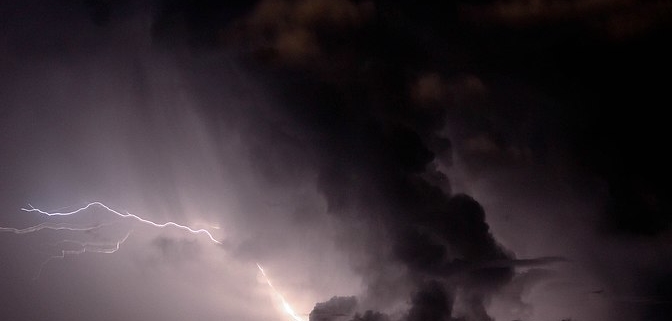

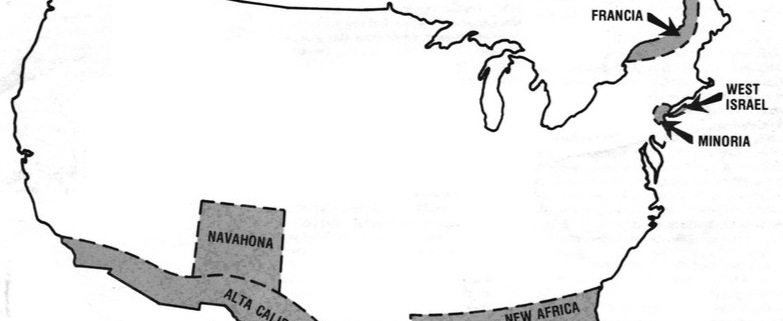

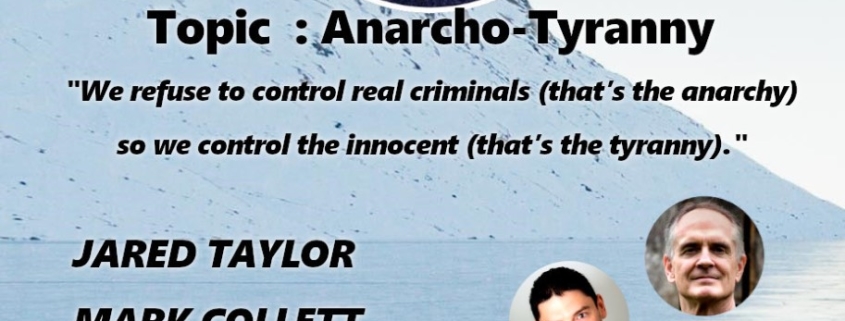
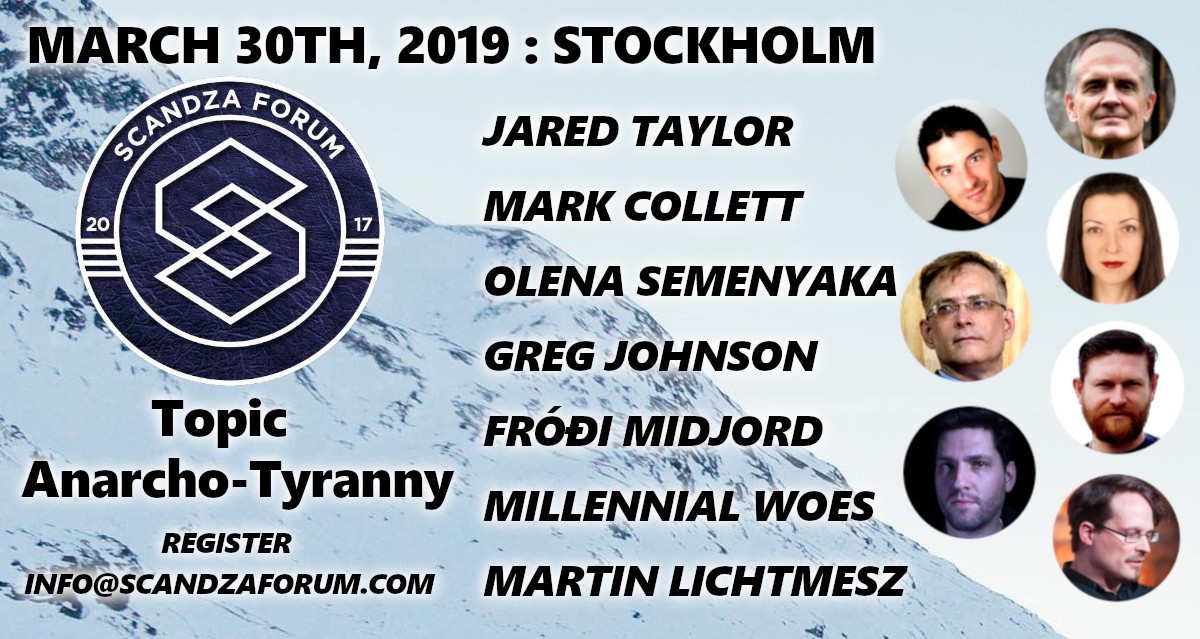 The next Scandza Forum is coming up in Stockholm, on March 30th. We are proud to give you a truly all-star lineup of advocates for Europe:
The next Scandza Forum is coming up in Stockholm, on March 30th. We are proud to give you a truly all-star lineup of advocates for Europe: